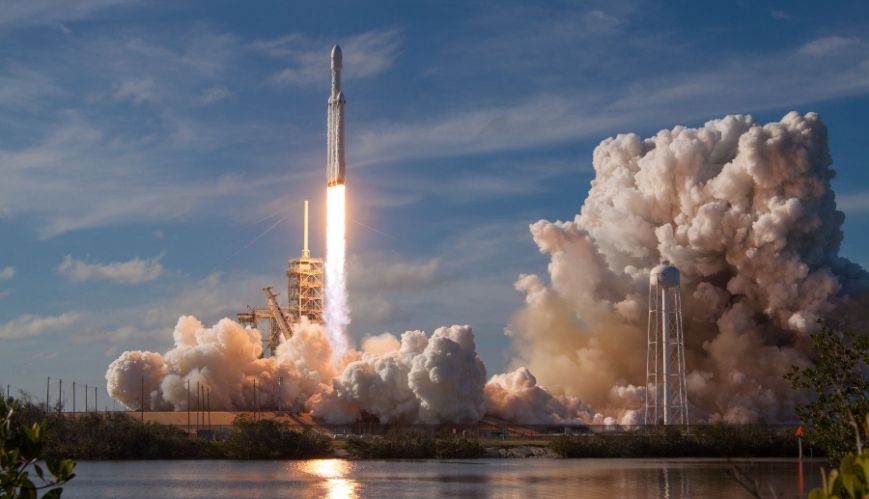The final frontier

The final frontier
7 May 2018
SpaceX rocket launch. Photo courtesy of SpaceX.
As Elon Musk indulges in the world’s highest-altitude product placement, putting both SpaceX and Tesla into solar orbit, theological questions inescapably occur to one, don’t they?
I’ve been a space and science fiction nut for a long, long time. My parents bought me a 12-volume encyclopedia of “aeronautics and space exploration” in the wake of the Apollo moon landings and I read them cover to cover. Visits to local used bookstores brought me boxes of worn-out paperback books, from H.G. Wells to Harlan Ellison, and from Ray Bradbury to C.S. Lewis (which I found pretty dull at 12 years old). We’re still waiting for those flying cars and jetpacks, although monorail elevated train services exist and video wristwatches are nicely approximated by smartphones running Skype, FaceTime, or Hangouts. But space travel itself? Forget the low-earth orbit stuff. What about getting into the black?
Some people wonder if the prospects of space travel and encounters with aliens will pose problems for Christianity. I don’t see why. Christians believe we have already met the Supreme Being. Meeting inhabitants of other planets is thus put into tolerable perspective, and in a not-frightening-end-of-the-world way, since the Book that actually tells us about the end of the world implicitly rules out global devastation wrought by space invaders.
What about alien species having their equivalent of the Fall? Would God somehow rescue them via incarnation and atonement, too? Some theologians say that’s impossible, since Jesus has now united himself with a human body. But theologians should be careful about pronouncing about what God cannot do.
We Christians believe that God is a Trinity because God has revealed Godself to us as Father, Son, and Holy Spirit.
But nowhere in the Bible does it say God is only three. Maybe God is more, and one of those “more” rescued aliens long, long ago in a galaxy far, far away. We have no reason to believe God is anything other than triune, of course. I still recite the Creed. I’m just saying that Christians have no immediate worry when some clever sceptic poses that question. “We don’t know how God treats life on other planets. The Bible addresses itself entirely to life on this one, and it seems to imply that we have our hands full already down here.”
What about space travel? When I was a kid reading about space, I encountered a Big Discouraging Fact. (Nowadays, there is another one: Given the theories regarding dark matter and dark energy, scientists believe we actually know almost nothing about 90 per cent of the universe.) The Big Discouraging Fact is that everything in the universe is – and I’ll use precise scientific terminology here – really, really far apart. Like, really far.
We’ve become used to science-fiction astronauts travelling vast distances. But screenwriters cheat all the time. Yes, it would take only three years to get to Jupiter (at top rocket speed, to be sure), but Jupiter is just over yonder in the solar neighbourhood. To get to the next nearest star, Alpha Centauri, would take 165,000 years at the speed of the space shuttle’s engines, and at least a human lifetime even with mind-bending technologies blasting us along at one-tenth the speed of light. That’s to the nearest star.
So forget “warp drive” and “worm holes” and the latest gobbledegook about instant space travel along vast networks of ... mushroom tendrils (it doesn’t make much more sense even when you watch Star Trek: Discovery). We’re isolated here.
And maybe for good reason. That boring old C.S. Lewis wrote of Earth as “the silent planet,” cordoned off from the rest of the universe because of the moral infection afflicting our world. Maybe we’ve been kept in this cosmic quarantine of uncrossable distances until God’s rehabilitative work with us is done.
And then? Then, like Jesus rising up from the Mount of Ascension, our bodies will be capable of new forms of locomotion. Or the Holy Spirit will just teleport us, like he seems to have done with Philip in Acts 8.
So, for the meanwhile, we should tend to the garden God gave us and submit to God’s healing of Earth’s gardeners. If we do, one day we’ll be ready to explore the rest of the cosmos without exploiting it. I can hardly wait.
John Stackhouse is Professor of Religious Studies at Crandall University in Canada.